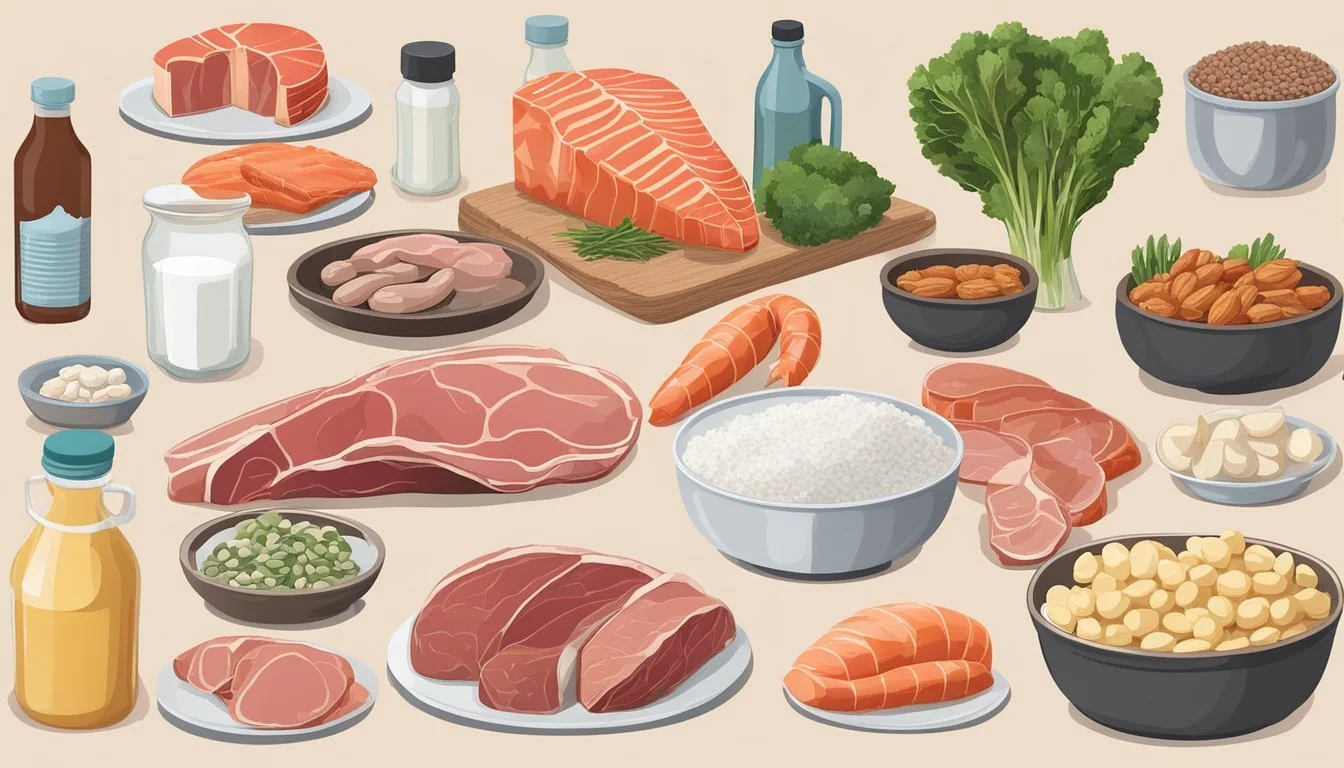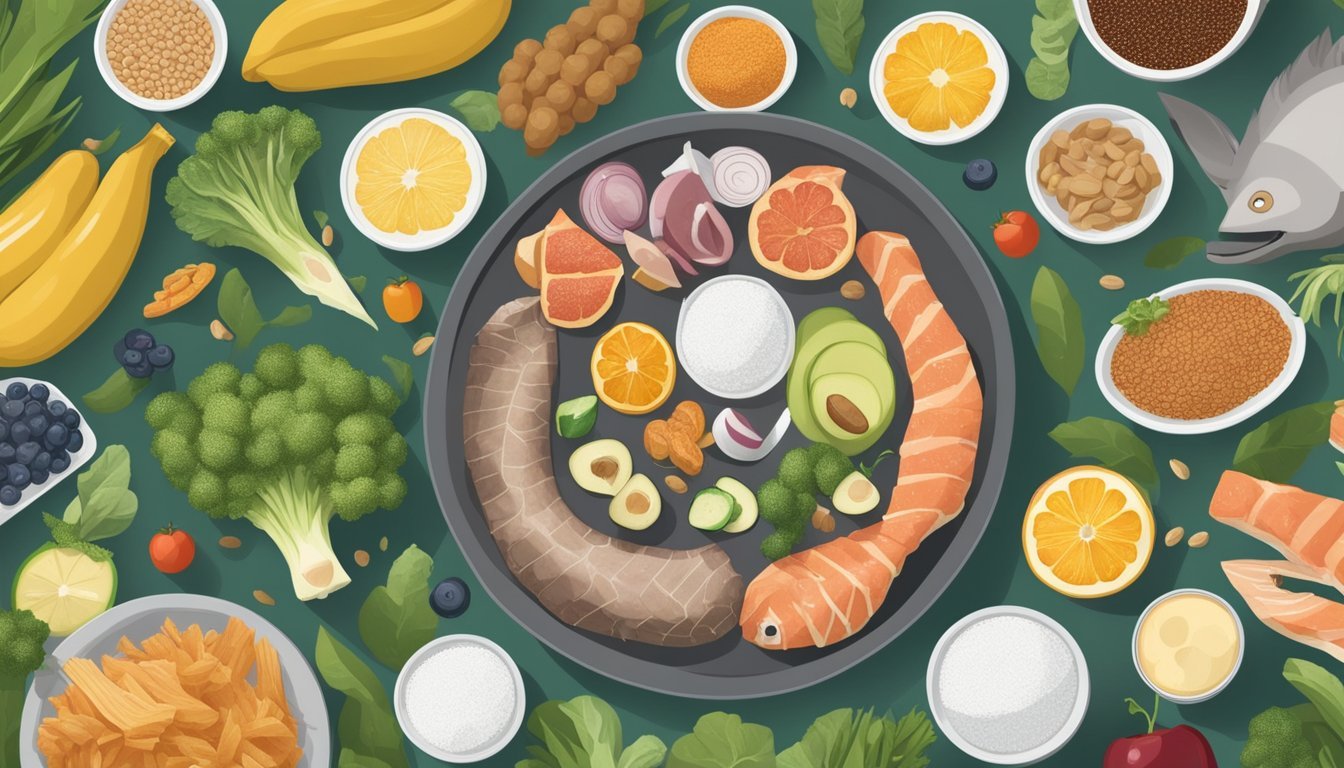Carnivore Diet and Zinc Intake
Ensuring Adequate Levels for Health
The carnivore diet, a regimen focusing primarily on animal-based foods, is under scrutiny for its nutritional completeness, particularly concerning the trace element zinc. Rich in protein and fat, this diet excludes plant-based nutrients, bringing into question the balance of vitamins and minerals achieved through its consumption. Zinc, vital for a strong immune system, is abundant in meat products, suggesting that the carnivore diet may offer sufficient quantities of this essential nutrient.
Current research into the carnivore diet indicates its potential to deliver adequate zinc to meet the body’s needs, considering that meat, a staple of this diet, typically provides a bioavailable form of zinc. While the diet's heavy reliance on animal foods ensures a high intake of protein and certain fats, the exclusion of plant-based foods distances it from the fiber and diverse vitamins and minerals typically present in a varied diet.
A critical evaluation of the carnivore diet's nutritional profile showcases its unconventional approach to fulfilling the body's requirements. Studies contrast the bioavailability of zinc from animal sources with that from plant-based diets, often finding the former to be more readily absorbed. However, long-term research is crucial to understanding the diet's full impact on health, including any potential deficiencies or health benefits associated with this restrictive dietary practice.
Fundamentals of the Carnivore Diet
The Carnivore Diet is characterized by its emphasis on animal-based foods and exclusion of plant-based foods, geared towards a high intake of protein and fat.
Defining the Carnivore Diet
The Carnivore Diet is a regimen that consists entirely of animal products. Adherents consume a variety of meats, fish, eggs, and certain dairy products while abstaining from all plant-derived foods. No fruits, vegetables, grains, or sugar are included in this diet, distinguishing it from paleo and ketogenic diets, which may incorporate limited plant foods.
Macronutrients in Meat-Based Diets
Meat-based diets such as the Carnivore Diet are rich in macronutrients crucial for the body's functions.
Protein: Essential for muscle repair and growth, protein is abundant in the diet, with meats and eggs as primary sources.
Fat: Serves as a major energy source, with dietary fat primarily sourced from meat, especially fatty cuts, and to a lesser extent from products like eggs and certain dairy.
This diet inherently restricts carbohydrates and fiber, as it eliminates the usual sources such as grains and vegetables.
Comparison with Other Diets
The Carnivore Diet stands in stark contrast to various other diets by its elimination of plant-based foods.
Ketogenic Diet: Both diets are low in carbohydrates, yet the ketogenic diet includes specific amounts of plant-based fats and vegetables.
Paleo Diet: Focuses on whole foods from both plant and animal sources, avoiding processed foods and grains. Unlike the Carnivore Diet, the paleo allows fruits, vegetables, and nuts.
In summary, the Carnivore Diet's restrictive nature results in a high intake of animal-based proteins and fats, while excluding carbohydrates, fiber, and all plant-based foods.
Zinc in the Carnivore Diet
Zinc plays an essential role in the body's immune function and metabolism. On a carnivore diet, which consists solely of animal products, ensuring adequate zinc intake is critical.
The Role of Zinc in the Body
Zinc is vital for numerous biological functions. It supports the immune system, DNA synthesis, wound healing, and cell division. This trace element also aids in the proper function of taste and smell. Due to its involvement in over 300 enzyme reactions, adequate zinc levels are paramount for maintaining overall health.
Sources of Zinc in Animal Products
Animal products are rich in bioavailable zinc, with the following being some of the best sources:
Red meat: (What wine goes well with red meat?) Beef, lamb, and pork contain high zinc contents.
Fish: Shellfish, (What wine goes well with shellfish?) especially oysters, provide substantial amounts of zinc.
Organ meats: For instance, beef liver is an excellent source of zinc.
Zinc Absorption and Metabolism
Zinc absorption can be influenced by various dietary factors. Animal proteins enhance zinc absorption, making meat, fish, and organ meats efficient sources. While the need for supplementation might arise in certain diets, a carnivore diet typically furnishes sufficient zinc, reducing the necessity for additional zinc supplements. Nevertheless, individual needs can vary, and absorption efficiency might differ based on one's metabolism and health status.
Health Benefits and Concerns
In addressing the carnivore diet, it's important to consider both the potential health benefits associated with its high zinc content and the risks linked to excluded food groups. This section dissects these angles, looking at the diet's nutritional advantages as well as the management and implications of its potential health risks.
Nutritional Benefits of the Carnivore Diet
The carnivore diet is rich in certain nutrients, primarily zinc, which is crucial for the immune system and cell division. Meat, a staple of the diet, is also a potent source of vitamins and minerals like B12, iron, and selenium. Adherents of this diet may experience reduced inflammation and an increase in energy, potentially due to entering a state of ketosis where the body burns fat for fuel instead of carbohydrates.
Vitamin B12: Essential for nerve function and blood production.
Iron: Vital for oxygen transport in the blood.
Selenium: Important for thyroid and immune function.
Potential Health Risks and Management
While the diet can offer appreciable amounts of zinc and other nutrients, following a carnivore diet poses significant health risks due to the absence of plant-based foods, potentially leading to nutrient deficiencies. The lack of dietary fiber can affect digestion, and the high intake of red and processed meat is associated with increased risks of heart disease and cancer.
Heart Disease: Linked to saturated fats and cholesterol in red meat.
Cancer: Some studies suggest a correlation between red meat consumption and increased cancer risk.
Nutrient Deficiencies: Limited intake of antioxidants and fiber found in fruits and vegetables.
Those opting for a carnivore diet need to be vigilant about their health and consider supplements or strategic dietary planning to mitigate these risks. Regular health check-ups and blood work are advisable to monitor for potential deficiencies and health issues.
Designing a Carnivore Diet Plan
A well-planned carnivore diet focuses on nutrient density and variety to ensure adequate zinc and overall nutritional intake. Careful selection of meats and incorporation of diverse animal products are key.
Sample Meal Plans and Recipes
Day 1:
Breakfast: Scrambled eggs and pan-seared beef liver
Lunch: Grilled lamb chops (What wine goes well with lamb chops?) with homemade bone broth
Dinner: Broiled salmon fillets
Recipe Highlight - Pan-Seared Beef Liver:
Slice beef liver thinly.
Season with salt and sear in a hot skillet with grass-fed butter until browned on both sides.
Serve hot.
Adjusting for Nutritional Balance
To achieve nutritional balance, individuals should consider the nutrient profile of different meats. Grass-fed meats often have a higher content of omega-3 fatty acids and fat-soluble vitamins. When designing a meal plan, one should strive for a balance between fat and protein, aiming for fattier cuts of beef, pork, or lamb to maintain energy levels without carbohydrates.
Nutrient-Dense Food Sources:
Beef: Ribeye, brisket, ground beef (ensure a mix of lean and fatty cuts)
Pork: Shoulder, belly, ribs (look for pastured pork when possible)
Lamb: Shanks, chops, leg (grass-fed is preferable)
Incorporating Organ Meats and Seafood
Organ meats, such as liver and kidney, are packed with bioavailable zinc and should be included regularly. Seafood, particularly oysters and shellfish, provides not only zinc but also important iodine and selenium. Including a variety of seafood, such as fish roe, mackerel, and sardines, can help round out the diet.
Suggested Weekly Intake:
Organ Meats: 2-3 servings
Seafood: 2-4 servings
Supplementation may be considered if specific nutritional goals aren't being met or for convenience. However, the emphasis should always be on whole food sources for the most natural nutrient profile and absorption.
Lifestyle Considerations
Adopting the carnivore diet requires several lifestyle adjustments that extend beyond dietary changes. These include considerations for exercise habits, navigating social settings, and the long-term viability of maintaining such a diet.
Exercise and Physical Activity
On the carnivore diet, individuals often experience changes in energy levels that can affect their exercise and physical activity routines. It's essential to monitor one's energy and focus—which can be heightened due to increased protein and fat intake—when adapting exercise regimens post-dietary changes. Some may find they have greater endurance and strength, while others might need time to adjust.
Tip: Start with moderate intensity workouts and gauge your body’s response before progressing.
Managing Cravings and Social Situations
Cravings for non-animal-based foods may arise, and social situations can present challenges for those strictly following a carnivore diet. Preparation is key in managing these aspects:
Cravings: Have readily available carnivore-friendly snacks to satisfy urges.
Social Situations: Communicate dietary preferences ahead of time or suggest suitable dining options.
Long-Term Sustainability
The sustainability of the carnivore diet depends on one's ability to maintain it with a balanced approach to nutrition and lifestyle:
Nutrients: Ensure adequate intake of all necessary nutrients, focusing on zinc for immune health.
Weight Loss: Monitor weight to prevent unwanted loss due to under-eating.
Sleep: Maintain good sleep hygiene as it can be affected by dietary changes.
Consider the individualized nature of the carnivore diet and how it aligns with personal health goals and lifestyle for long-term sustainability.
Controversies and Misconceptions
The topic of the carnivore diet and its implications has been a subject of intense debate, particularly concerning health outcomes and nutritional completeness. These controversies often center around the consumption of red meat, the exclusion of plant foods, and the diet's potential impact on the environment and ethical practices.
Red Meat and Chronic Disease Link
Research on the relationship between red meat and chronic diseases such as heart disease and cancer has produced mixed results. Advocates of the carnivore diet argue that red meat is a nutrient-dense food source that is unfairly blamed for health issues. They point out studies like the one from a systematic review that suggest reducing saturated fat intake does not significantly affect heart disease risk. Critics, however, highlight epidemiological evidence linking high consumption of red meat, especially processed varieties, to an increased risk of chronic diseases.
Criticisms of Excluding Plant Foods
The exclusion of plant foods such as vegetables, fruits, nuts, grains, and legumes is a primary criticism of the carnivore diet. Opponents assert that these foods provide essential vitamins, minerals, fibers, and phytonutrients that are not found in animal products, which may contribute to long-term health risks. For instance, a high intake of fiber, which is absent in the carnivore diet, is associated with various health benefits. Proponents of the carnivore diet, however, argue that animal products alone can provide all necessary nutrients for human health.
Environmental and Ethical Considerations
The environmental impact of a meat-heavy diet is a growing concern. Critics point out that livestock farming is a significant contributor to greenhouse gas emissions, deforestation, and water use. The ethical consideration of animal welfare also adds to the debate, with some suggesting that plant-based diets are more humane. Carnivore diet proponents may counter these arguments by emphasizing the possibility of sourcing meat from ethical and sustainable farms. However, the scalability of such practices in meeting global dietary demands remains questionable.
Scientific Research and Perspectives
Recent scientific research and expert reviews provide insights into the potential health outcomes associated with the carnivore diet, particularly in relation to zinc intake and the absence of plant foods.
Studies on Meat-Based Diets
Research indicates that meat-based diets, such as the carnivore diet, may provide high levels of protein and essential minerals like zinc. A carnivore diet is a form of ketogenic diet devoid of plant foods, relying solely on animal-based nutrition. Zinc is crucial for immune function, DNA synthesis, and cellular metabolism. Studies suggest that an incremental increase in zinc intake can be linked to a lowered risk of certain cancers. For example, a daily increment of 5 mg of zinc has been associated with reduced risks of colorectal and esophageal cancer. However, high doses, such as a daily 100 mg, have not shown benefits in reducing the risk of prostate cancer.
In the context of nutrient balance, mammalian carnivores like cats are often referenced since they naturally consume high-protein, high-fat diets, analogous to the carnivore diet in humans. This research provides evidence that these diets can fulfill an animal's macronutrient requirements. However, it is unclear if these findings fully translate to human health, given the differences in human and feline physiology and nutritional needs.
Expert Opinions and Reviews
Experts express cautious views about the carnivore diet due to its elimination of plant foods and potential nutrient deficiencies. Antioxidants, essential for combating oxidative stress and inflammation, are abundant in plant foods but limited in meat-based diets. These diets are often low in vitamins and minerals that are typically consumed in greater amounts in plant-based diets, like vitamin B12, vitamin D, and iodine.
Furthermore, reviews highlight the possibility of inadequate vitamin intake and bone health concerns due to lower bone mineral density and lower intake of bone-supporting nutrients like calcium and vitamin D, which are less prevalent in strictly meat-based diets. Although the carnivore diet might provide adequate levels of certain nutrients such as zinc, the absence of plant-based foods could lead to gaps in overall nutritional profiles, which can potentially impact long-term health.
Experts remain neutral but urge caution, advocating further research into the diet's potential health effects, tolerability, and long-term sustainability. They encourage monitoring nutrient intake and status to avoid deficiencies that could lead to health issues.
Supplements and Additives
The Carnivore Diet emphasizes consumption of animal products which may cover many nutritional needs; however, specific vitamins and minerals might require supplementation due to lack of variety in the diet. Additives present in animal products can also have implications on health and should be considered.
Vitamins and Mineral Supplementation
Individuals following the Carnivore Diet may be concerned about obtaining certain vitamins and minerals. While meat can provide many nutrients, such as B12 and heme iron, there are other elements that might be less abundant. For example, vitamin C is not plentiful in animal products, leading some to consider supplementation, although the requirement is thought to be lower in the absence of dietary carbohydrates.
Zinc is essential for immune function and is abundant in meat, thus supplementation is not typically needed on a carnivore diet. However, for those concerned about maintaining a balanced intake, they should prioritize variety, including organ meats and seafood, to obtain a comprehensive profile of nutrients.
Supplementing with vitamins and minerals should be individualized, considering that too much of certain nutrients is not beneficial either. For instance, an excess of vitamin A can lead to toxicity.
Key Supplements:
Vitamin C: For potential antioxidant support, though requirement may be debated.
Vitamin D3: If sunlight exposure is inadequate.
Magnesium: As it may be less available in animal foods.
Calcium: In the absence of dairy consumption.
Common Additives in Animal Products
Animal products can contain various additives, which are introduced during processing. Processed meats like bacon or sausages often have additional salt or sodium compounds, which are used for flavor and preservation. Those consuming the Carnivore Diet might wish to limit their intake of heavily processed meats due to these additives.
Dairy products, including butter, ghee, and heavy cream, can be sources of nutrition on the diet, yet some may have additives to extend shelf life or enhance taste. Individuals following the Carnivore Diet should pay attention to labels if they wish to avoid these additional substances.
Common Additives to be Aware of:
Salt/Sodium: Used extensively in processed meats for preservation.
Nitrates/Nitrites: Often found in cured meats; some controversy exists regarding their health impact.
Artificial Flavors or Preservatives: Occasionally added to dairy products.
By considering the need for supplements judiciously and monitoring the presence of additives in animal products, those on the Carnivore Diet can make informed choices to support their overall health.
Nutrient Management
Proper nutrient management on a carnivore diet is essential as it may lead to deficiencies in vital nutrients such as vitamin C, iron, and folate. Addressing these potential gaps, monitoring health markers, and adjusting the diet to fit individual needs are key for maintaining overall health and preventing conditions like scurvy.
Addressing Potential Deficiencies
On a carnivore diet, individuals may risk insufficient intake of certain nutrients that are commonly found in plant-based foods. Here's how one can address potential deficiencies:
Vitamin C: Although traditionally associated with fruits and vegetables, certain organ meats may provide vitamin C.
Iron: While red meat is rich in heme iron, which is highly bioavailable, individuals must ensure they consume a variety of organ meats to cover the full spectrum of nutrients.
Folate: Organ meats, especially liver, are a good source of folate, important for DNA synthesis and repair.
Zinc: A carnivore diet is generally high in zinc, critical for immune function, mostly due to high meat consumption.
It is crucial to include a variety of animal-based foods to mitigate the risk of deficiencies.
Monitoring Health Markers
Regular monitoring of health markers can provide insight into the body's nutrient status. Important health markers to track include:
Blood counts and iron levels: To screen for anemia.
Bone health indicators: Including vitamin D and calcium levels, to prevent poor bone health.
Mood-related markers: As deficiencies in nutrients like folate and iron may affect mental health.
Blood tests can reveal nutrient deficiencies and any adjustments needed in the diet.
Tailoring Diet to Individual Needs
Each individual's body differs in nutrient requirements due to factors such as age, gender, activity level, and health status. Thus, personalization is key:
Age and gender: These factors influence iron requirements, as women and older individuals may need different amounts.
Activity level: More active individuals typically require increased protein and mineral intake to support muscle and bone health.
Health status: For those with specific medical conditions, nutrient needs may vary significantly from the general population.
Adapting the carnivore diet to one's unique needs ensures they receive their required macro- and micronutrients.
Conclusion and Future Directions
Research indicates zinc is vital for immune function and overall health. Individuals following a carnivore diet—primarily composed of animal products—typically consume an adequate amount of zinc, given its abundance in meat. However, it's imperative to monitor zinc intake to ensure it meets the body's needs without exceeding the upper safe limits.
Future studies should aim to quantify the optimal zinc intake for those on a carnivore diet to balance benefits against the risk of potential toxicity. They should scrutinize the long-term effects of this dietary strategy on zinc status and health indicators.
The research community could explore the relation of a carnivore diet with zinc homeostasis by examining:
Dietary patterns and their impact on zinc bioavailability.
The interaction between high meat consumption and overall micronutrient balance.
Potential health risks or benefits over a prolonged period.
Future directions might also involve developing guidelines specific to carnivore diet adherents to prevent nutrient deficiencies and optimize health outcomes. Such guidelines should be forged on evidence-based research that considers the variety within carnivore dietary practices.
In summary, as the carnivore diet gains popularity, it's crucial that researchers provide clear recommendations for zinc intake. This would enable individuals to make informed decisions that support their health objectives.









